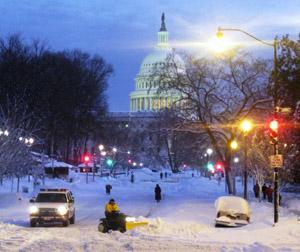
By Barb Arland-Fye
Three diocesan volunteers got caught in the back-to-back snowstorms that paralyzed the Washington, D.C., area this month while the volunteers were participating in a Catholic Social Ministry Gathering.
Despite being without a change of clothes or boots for four days, they said the experience was a positive one because of what they learned at the conference and from their exposure to adversity.
“The whole message of the gathering centered around people living in poverty and the needs of the Catholic Church. And when we were concerned about four days without a change of clothes, that seemed a little petty,” said Loxi Hopkins, director of the Diocese of Davenport’s Catholic Campaign for Human Development (CCHD). Accompanying her at the gathering and workshops that preceded it were Glenn Leach and Msgr. Marvin Mottet. All three volunteer in the Davenport Diocese’s Social Action Department.
They planned to stay with friends of Msgr. Mottet in Maryland and commute into Washington, D.C. daily. The snowstorm, however, separated them from their lodging and luggage. Fortunately, they were able to find a hotel to stay at near the conference site.
While they experienced some elements of discomfort and physical difficulties — Leach sprained his ankle the previous week during a snow storm in Des Moines — “the opportunity to associate with such inspiring people was worth it,” Leach said.
“It’s always an excellent meeting,” said Msgr. Mottet. “We’re up to 20 national Catholic groups at the meeting. A common thread runs through it: we’re all concerned about justice and pro-life issues.”
All together, about 200 people attended the Feb. 7-10 gathering, half the number expected, Hopkins said. “Some of the speakers and some of the priests and bishops were unable to get there. But (organizers) did a marvelous job of switching things around and keeping things going,” she noted.
“One of speakers was able to speak to us from his kitchen in California via Skype (an Internet phone video system),” Leach said. “We were able to see the speaker and he was able to see the conference room and respond to questions after his presentation.”
During the conference the trio walked in the heavy snow to Capitol Hill to share a message with their U.S. congressional delegation on issues such as immigration, health care reform, global climate change and international relations, with an emphasis on Haiti and Afghanistan. They met with the staffs of Sen. Tom Harkin and Rep. Bruce Braley, and had an in-person visit with Sen. Charles Grassley. “We tried to present the position of the U.S. bishops (USCCB) on each issue, based on Catholic Social Teaching,” Msgr. Mottet said. Because of weather conditions — about 45 inches of snow fell during their stay — the capitol was nearly deserted and they were able to meet with legislators and staffs longer than usual.
Leach said among the conference’s presentations that impacted him greatly was one on immigration. The presenter distributed cards showing the image of a 14-year-old girl who had attempted to emigrate from El Salvador to the United States with her 9-year-old brother. She died in 2008 in the Arizona desert.
“The thing that struck me was that girl could have been my oldest granddaughter,” Leach said. The girl was one of 1,138 immigrants whose bodies were found in the Arizona desert by the U.S. Border patrol between October 1999 and September 2008.
All three diocesan volunteers said the greatest impact of the conference was a speech by Father Bryan Massingale, a Marquette University theologian, who analyzed the social and theological situation today.
Fr. Massingale encouraged his audience to be positive in the face of blistering attacks against the USCCB and the social justice-oriented organizations it supports. He said “it’s important to show who we are as church,” Hopkins said.
“There are always those who react out of fear and uncertainty and our job as Catholics is to live our faith in such a way that people see the consistency of our beliefs and our actions,” Leach added.
Some Catholics and non-Catholics are “fearful of what America is becoming — a mixed-race society. So there’s fear. They can’t recognize who we are,” Msgr. Mottet said. “The church is universal, which means ‘catholic,’ and we are becoming catholic.”
He worries that certain anti-Catholic groups — and groups that call themselves Catholic — are trying to “silence the bishops on social justice.”
As a result of his experience at the conference, Msgr. Mottet said “I’m praying for healing for our divided nation, our divided church and our divided world.”








